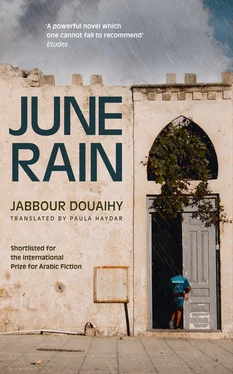‘No. They say it every day.’
‘Which children?’
‘The first one is George, my cousin.’
‘And what do you say back?’
‘I don’t know.’
My father got upset, but his anger didn’t last long, as usual.
‘How could you accept that? How could you say nothing? Didn’t you tell them that you were a Semaani before any of them?’
‘They say we follow the milk,’ he said, sobbing and giving up. ‘We’re from Al-Mazraa.’
‘What else do they say?’
Munir was silent. It was as though he’d got enough off of his chest. But my father wasn’t satisfied.
‘What?’
‘They say you’re not a man.’
He pronounced the word rijjaal , the Arabic word for ‘man’, with a double ‘j’ of course. The plural of rijjaal is rjaal , with no vowel after the ‘r’ and a long ‘aa’ vowel after the ‘j’. It takes a common masculine plural form, as opposed to the plural of abadaay (tough guy) which takes the common feminine plural form that ends with ‘ aat ’, abadaayaat . The word for ‘men’, rjaal , is also pronounced rjayl , again with no vowel after the ‘r’. The word is open to several derivations and has various related verbs, among which are the verbs rajjala (to take on manly characteristics) and tamarjala (to act tough).
Some of those men who enthusiastically accompanied their headmen to the anniversary mass commemorating that ill-omened event were suited to the verb rajjala very well. The sudden and the unexpected have a way of revealing people’s true mettle. However, those men who participated in the Burj al-Hawa incident did not deserve the same title of rjaal (men) that their ancestors who fought with Yusuf Bey Karam against the Turkish Army had earned. Perhaps that was because their ancestors who fought against the Turkish Army had confronted strangers rather than firing their bullets at one another. Or, as people like to boast, ‘Jails were made for men,’ but it should be pointed out that while the incident sent a lot of people to the grave, it sent hardly anyone to jail.
The etymology goes even further. Another plural form, rjaalaat (men), was also used but these men were few and far between. The term referred specifically to the men who had fought for Lebanese Independence fourteen years earlier.
For every man who rajjala (took on manly characteristics) there was one who ajbana (behaved like a coward). That is, he had the opportunity to destroy the enemy but did not. And also, there were men who tahaayadu (remained neutral), meaning they chose not to participate in wielding their weapons and firing them because their familial blood-solidarity was weak, in the sense that they did not belong to the heart and soul of the family but rather to its extremities. It goes without saying that ibn al-‘aa’ila (the true son of the family) cannot be neutral because his neutrality would be interpreted as defeat. The epitome of manliness is expressed in these homonym verses:
Neither behind me nor in front of me nor next to me ( hadd-ay )
The dust of horses’ hooves gives me pleasure and so do heroic verses ( al-hid-ay )
O saddleback, you are my cradle and my grave ( lahd-ay )
Whenever my country is threatened
As for the regression of the era of manliness, that can be summed up by saying that men themselves turn into women, are infected with the feminine ‘ adwa al-mu’annath ’ when they lose their manliness. Some might say that the era of manliness disappeared with the expansion of the state’s influence and military power which caused the appearance of al-frari , plural frariyyeh , meaning fugitives, also referred to as tuffaar , in nearby areas. These were the clever tough men running from the law. Others say that the revolver, or even the automatic version of it, had not threatened the existence of the rijjaal (real man) even if it had opened the door to attacks from behind and cowardly ambushes, up until the hand-held automatic rifle appeared. No one could act tough around the Kalashnikov with its thirty rounds, and that was the primary cause for the waning of the age of tough guys. The final word now belonged to guns rather than men.
My father smiled bitterly and said, ‘OK, so I’m not a man. It’s OK. Open the door, son. Open it!’ He went on with a muffled voice as if talking to himself, ‘Put your mind at ease. You won’t hear that kind of talk after today…’
Exactly two months later, my father picked us up and brought us here. We took every precaution to leave without making any noise or raising any suspicions. To avoid people’s stares, we moved our furniture at night. Getting out of there was my mother’s dream come true and our second betrayal of our relatives. My father rented this house for us because it overlooks the bay. We were able to buy it after a number of years. When we first arrived we used to sit here on an old squeaky porch swing that the former owners had left behind. The four of us would sit on it, side by side, watching the fishing boat lights as the moon glimmered on the surface of the water on those warm summer evenings. And if for some reason we woke up in the middle of the night, we would always find our father standing outside, seemingly counting the stars as he smoked.
We made a lot of friends here, but every time we were asked where we were from and we told them from there , our new friends would open their eyes wide in disbelief. How could we be from there and have such a refined demeanour and hardly any accent?
My father opened a small shop that carried carpentry and painting necessities. He made a lot of friends here and our neighbours were always very nice, but my father continued to pine for his cousins and his hometown. The moment one of them turned up, he rushed up to them. He ran after them. Sometimes he recognised them by their features and would call them by their family names; their blond colouring and tall stature gave them away. He would accompany them to wherever their errands led them — to government offices or the Australian consulate to apply for immigration visas. He would go with them to Beirut, where they would have been lost without him, and he would help them with their transactions. He’d invite them to lunch at the Qubrusli Restaurant where he’d order his favourite meal — kefta, hummus , and two glasses of arak . He’d sit with them, tête-à-tête, and never allowed them to pay for anything from their own pocket. He told them he didn’t want to impose on my mother by inviting them to the house. He warmed up to asking them for news about everyone by name.
My father is dead now. One afternoon, he went into his room to take a nap, taking the newspaper with him, and didn’t wake up. We took him up there in a small procession of cars and after praying over him in the church, buried him under the first cypress tree to the right of the cemetery entrance. They congregated around us — relatives we had stayed in touch with and people we didn’t know who never missed a funeral or reception for condolences. The women were covered in black out of respect for my father. They sat next to us, asked about us, invited us to their homes. I felt we were indebted to them. From that day on, if I came across any of them lost in the city, I would rush after them and do everything to help them and invite them to visit us. I used to say to my mother that I sometimes longed to go to the town. That didn’t surprise her; she felt my feelings were normal. As for her, I think we were her hometown.
Читать дальше












